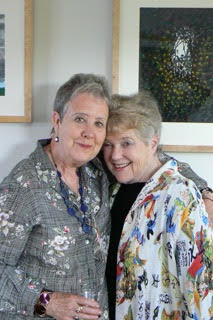One month since her passing, Seattle's literary community still mourns Joan Swift
When news broke last month that Joan Swift had died, the Seattle literary community erupted in outpourings of grief. A shared sensation spread quickly around Facebook that something momentous had passed with her. At 90 years old, Swift was well-loved by many generations of Seattle writers, and she provided a direct link to the history of Northwest literature. She was one of the last living writers to learn directly from Seattle poetry godfather Theodore Roethke, and she shepherded generations of writers out of anonymity and into maturity.

Tess Gallagher (on the left on the photo) met Swift (on the right) in 1963 when both had enrolled in what would be Roethke’s final spring poetry workshop. Roethke developed nicknames for several of his students, and “he called [Swift] ‘Mother’ since she had two children and was a bit older than others” in the class, Gallagher recalls.
Gallagher was 20 years old, and one of the two youngest students in the workshop. “Joan was extremely kind to me and took me under her wing,” Gallagher writes in an email. “We sat near each other in the class and it helped me greatly that she took an interest in my poems and clarified things that were asked of us by Roethke from time to time.” She doesn’t know what she would have done had Swift not “made me welcome in her quiet, bemused but affable way.” Swift and Gallagher have been friends ever since. “I considered her a close friend with whom one could share life details and gossip a bit with and just laugh with in a special way,” she writes.
The Puget Sound region is full of stories like that — tales of how Swift reached out to others, and how that first act of kindness blossomed into a lifelong friendship. Seattle poet Esther Altshul Helfgott first saw Swift read at the Frye around the year 2000, and they became fast friends. Helfgott started the It’s About Time open mic series at Ravenna's Eckstein Senior Center a quarter-century ago as a way for new writers to practice their craft on a public platform. She says “some poets and writers of Joan's caliber wouldn't give us a second look, but Joan read for” the series on multiple occasions; she especially appreciated that Swift “treated me like an equal. That doesn’t happen with well-known people in the literary community. She was just so warm and giving.”
Swift had been a high-profile poet in the Seattle area for so long that her monolithic presence could sometimes overshadow the very fine, delicate work in her poems. “Her use of language is so beautiful and lyrical, and the warmth of her personality is reflected in her language,” Helfgott says.
“She is so entirely present in her encounters within the poem that, reading her poems, you accompany her at a high intensity,” Gallagher says. “Her endings often sink the poem deep into your memory so the poem is carried and not released. She is so exact in her image and language that one immediately trusts her, follows her. Her voice has its truth seemingly embedded within it.”
The honesty of Swift’s voice opened doors for other poets. Shortly after news of Swift’s death broke, Sherman Alexie told me about the impact that her work had on him as a young poet. “Way back when, in college, or just after college, I read a Joan Swift poem about eagles having sex as they plummet toward the earth, how they sometimes forget to uncouple and crash to their deaths,” Alexie says. “And I remember thinking, ‘Wait, it's cool to write a poem about eagles fucking to death? Awesome!’ Joan introduced a new rule of poetry to me. Or broke the old rules. Or both.”
“She writes about difficult subjects that others might shy away from,” Gallagher says, citing the poem “Shin-Ichi’s Tricycle” from Swift’s forthcoming book from Cave Moon press as an example. “That ending makes us wear the death of the little boy in the bombing of Hiroshima and she convicts us of us death in such a deadly no-escape way in her ending. She’s a take-no-prisoners kind of writer.”
Swift wrote candidly about rape, Gallagher says, “long before other women would write about it.” Helfgott says that one of the last poems Swift ever completed, “Sometimes a Lake” is one of her most courageous. The poem addresses the suicide of Swift’s daughter, Laurie, and it “is so gorgeous. When she would talk on the phone about Laurie, there was nothing in her voice or her words speaking to me that were like that poem.” In the poem, Swift captures the moment when she goes through Laurie’s effects, looking for a greater meaning that isn’t there.
These boxes are almost empty—
just air and losses.
But here’s a photo album where you’re smiling
with friends, your borderline disorder group.
Everyone I talked to remarks that Swift was working right up until the end. At 90, by all accounts, she was still as sharp a writer and reader as she’d ever been. Cave Moon Press publisher Doug Johnson was working closely with Swift on a volume of poems titled The Body that Follows Us that will be published next month. On Tuesday, May 16th, Open Books in Wallingford will host a memorial service for Swift that will serve as a launch for the book.
Johnson says that Swift was thoroughly involved with the editing process. Unlike some of the books he’s published, Swift “handed me an extremely well-formatted book,” one that was clean and well-formatted and basically ready for publication immediately. But they passed the manuscript back and forth for months, editing it and talking about fonts and making sure everything was perfect.
“Joan very much wanted to get it extremely right,” Johnson says. “She wanted to carry it through to the best of her ability.”